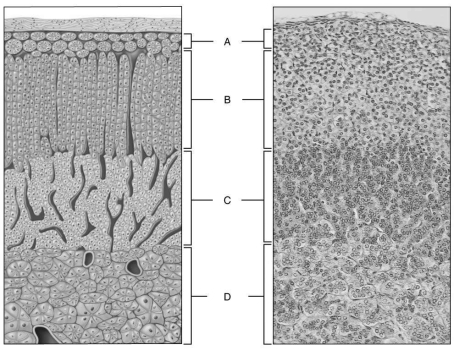Exam 15: The Endocrine System
Exam 1: The Human Body: an Orientation131 Questions
Exam 2: Chemistry Comes Alive146 Questions
Exam 3: Cells: the Living Units136 Questions
Exam 4: Tissue: the Living Fabric111 Questions
Exam 5: The Integumentary System118 Questions
Exam 6: Bones and Skeletal Tissue111 Questions
Exam 7: The Skeleton121 Questions
Exam 8: Joints104 Questions
Exam 9: Muscles and Muscle Tissue129 Questions
Exam 10: The Muscular System118 Questions
Exam 11: Fundamentals of the Nervous System and Nervous Tissue114 Questions
Exam 12: The Central Nervous System158 Questions
Exam 13: The Peripheral Nervous System and Reflex Activity175 Questions
Exam 14: The Autonomic Nervous System106 Questions
Exam 15: The Endocrine System134 Questions
Exam 16: Blood125 Questions
Exam 17: The Cardiovascular System: the Heart106 Questions
Exam 18: The Cardiovascular System: Blood Vessels134 Questions
Exam 19: The Lymphatic System and Lymphoid Organs and Tissues90 Questions
Exam 20: The Immune System: Innate and Adaptive Body Defenses128 Questions
Exam 21: The Respiratory System119 Questions
Exam 22: The Digestive System153 Questions
Exam 23: Nutrition, Metabolism, and Body Temperature Regulation127 Questions
Exam 24: The Urinary System118 Questions
Exam 25: Fluid, Electrolyte, and Acid-Base Balance115 Questions
Exam 26: The Reproductive System130 Questions
Select questions type
Which of the following is not a change that may be caused by hormonal stimulus?
(Multiple Choice)
4.8/5  (33)
(33)
Which of the following hormones suppresses appetite and increases energy expenditure?
(Multiple Choice)
4.9/5  (37)
(37)
What is the most important nursing intervention when caring for a patient with Cushing's syndrome?
(Essay)
4.8/5  (36)
(36)
Which of the choices below is not a factor required for target cell activation by hormone receptor interaction?
(Multiple Choice)
4.9/5  (30)
(30)
Thyroxine is a peptide hormone, but its mechanism is different from other peptide hormones. Which of the following statements is True concerning this difference?
(Multiple Choice)
4.8/5  (37)
(37)
The neurohypophysis or posterior lobe of the pituitary gland is not a True endocrine gland because ________.
(Multiple Choice)
4.7/5  (33)
(33)
Match the following:
A) Graves' disease
B) Acromegaly
C) Addison's disease
D) Diabetes mellitus
E) Pituitary dwarfism
-Hypersecretion of growth hormone.
(Essay)
4.8/5  (47)
(47)
Thyroid hormone (a small iodinated amine) enters target cells in a manner similar to ________.
(Multiple Choice)
4.8/5  (42)
(42)
Match the following:
A) Myxedema
B) Acromegaly
C) Cretinism
D) Cushing's disease
-Hyposecretion of the thyroid in adults.
(Essay)
4.7/5  (44)
(44)
As a result of stress the adenohypophysis releases ________, which stimulates release of hormones from the adrenal cortex that retain sodium and water, increase blood sugar, and begin breaking down fats.
(Short Answer)
4.9/5  (34)
(34)
Match the following:
A) Myxedema
B) Acromegaly
C) Cretinism
D) Cushing's disease
-Hypersecretion of the adrenal cortex.
(Essay)
4.7/5  (37)
(37)
Mineralocorticoid is to aldosterone as glucocorticoid is to ________.
(Multiple Choice)
4.9/5  (47)
(47)
 Figure 15.3
Using Figure 15.3, match the following:
-Produces aldosterone.
Figure 15.3
Using Figure 15.3, match the following:
-Produces aldosterone.
(Short Answer)
4.8/5  (32)
(32)
Which of the following is not a category of endocrine gland stimulus?
(Multiple Choice)
4.8/5  (40)
(40)
Cells that respond to peptide hormones usually do so through a sequence of biochemical reactions involving receptor and kinase activation. In order for cells to respond, it is necessary for first and second messengers to communicate. This is possible because ________.
(Multiple Choice)
4.8/5  (40)
(40)
It was often rumored that one of our deceased presidents was suffering from Addison's disease (inadequate synthesis of mineralocorticoids and glucocorticoids). What symptoms may have led to the diagnosis of this condition?
(Essay)
4.9/5  (34)
(34)
Which of the following is not a parathyroid gland mechanism to maintain adequate levels of blood calcium?
(Multiple Choice)
5.0/5  (33)
(33)
Showing 81 - 100 of 134
Filters
- Essay(0)
- Multiple Choice(0)
- Short Answer(0)
- True False(0)
- Matching(0)